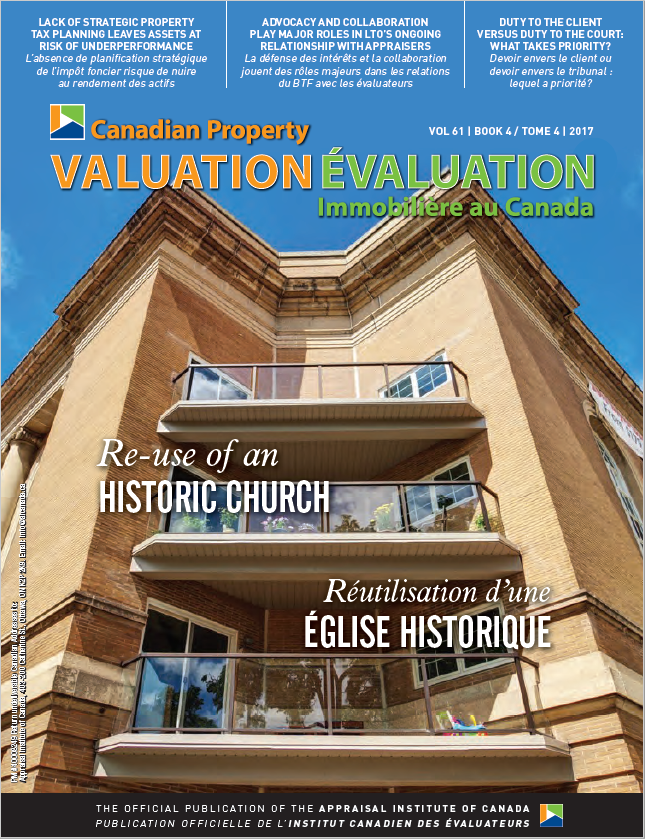Expert or arbitrator?
Canadian Property Valuation Magazine
Search the Library Online
PROFESSIONAL PRACTICE MATTERS
Expert or arbitrator?
(Part of this article is reproduced with permission from The Advocate. ’A View From the Centre’ (2017) 75 Advocate 555)
By Carl Nilsen, AACI, P.App
As appraisers, we are often retained to provide independent expert opinions on real estate valuation matters. In the adversarial process of litigation or arbitration, we are typically retained by one of the parties to a dispute; the expert report then becomes part of the evidence used by that party in presenting their case. This use of our expertise is familiar to most of us, but there are other roles we may be asked to take on. For example, both parties may retain us to be the decision maker. If we do find ourselves being asked to resolve a dispute, how should we respond to such a request and how can the parties and their counsel ensure this process runs as smoothly as they would wish?
The first question to ask is whether we are to be appointed as an arbitrator or as an independent expert. Consequently, an understanding of the difference between these two functions is key. An arbitrator considers evidence such as expert opinions and reaches a conclusion as to the reliability and relevance of that evidence and the degree to which it can inform their decision. The arbitrator relies solely on the evidence presented to them by the parties. The expert chooses and gathers their own evidence; they then use this and their experience to express an opinion on the disputed matter or some aspect of it based on instructions provided by counsel. Therefore, the arbitrator’s decision is reached in a very different way from the more investigative process followed by the expert.
When experts are asked to assist the parties in resolving issues within their field of expertise, it is usually to avoid what might be seen as a more daunting arbitration process. Under these circumstances, the lines between the roles of arbitrator and expert are in danger of becoming blurred. Acting as arbitrators, experienced professionals will understand the distinction well and will avoid inserting their own experience or knowledge into the evidentiary mix. Experts asked to resolve a dispute are likely to be less familiar with the role they are being asked to play and what ground rules govern their engagement. The parties themselves, faced with a disarmingly clear-looking resolution provision in an agreement, may also be unaware of the implications of not establishing at the outset what the role of the expert is intended to be. Although it may not be specified as such, are they, in fact, being asked to act as an arbitrator? For the process to work effectively, both the expert and the parties need to understand exactly how that role is defined and what the implications of the possible alternatives are.
In the area of real estate valuation, the need for resolution of differences comes up most frequently in the context of lease rent reviews or where a contractual or other relationship requires a specific determination of value. Typically, the resolution process will be found in the contractual document itself. Most frequently, this will be through arbitration, but there are often instances where the parties specify a mechanism other than arbitration. Such a mechanism is usually intended to avoid the adversarial process by appointing an expert, or experts, to express an objective, professional opinion. Frequently there is a formula, often quite creative, to establish a mechanism for bridging any gaps. If the process is considered to be a de facto arbitration, the rules under which the expert is to operate are clear: they are set out in the provincial Arbitration Act and, in BC, the rules of the BC International Commercial Arbitration Centre. For an expert-based resolution process, the mechanisms and rules are not so prescriptive and, in the absence of clear direction, require the appointed expert(s) to seek that clarity from the parties before proceeding.
At this point, an example might be useful to illustrate the kind of situation being described. Imagine a purchase and sale agreement that provides for the purchase price to be resolved by the parties each appointing an appraiser; in the absence of resolution, a third appraiser is to be appointed. Having failed to reach agreement based on the first two appraisals, the parties are nevertheless keen to avoid repeating the entire appraisal process and ask the third expert to review the other reports and express an opinion based on them. At this point, the third appraiser needs to think carefully about what they are being asked to do. Reviewing evidence in the form of reports will be a familiar process to them, but, if they are to express an opinion, they will need to be sure both parties agree on the ground rules: is it the parties intention that the opinion be binding? Are they to act as an arbitrator or expert? What are the procedures regarding provision of information by the parties? How should the parties be permitted to respond to such information?
In this example, if the parties agree that the expert is to be appointed as an arbitrator, the rules will be clear. The expert will nevertheless need to understand what these rules are and be able to convey them to the parties. They will also need to establish a procedure, which may, by agreement, be designed to be less formal in order to best meet the parties’ objectives. As an arbitrator, then, the appointed expert will know how to proceed and what happens if either of the parties does not like the decision. The parties should also have a good understanding of what they have embarked on.
If not acting as an arbitrator, the independent expert deciding the matter may believe they are simply doing what they do every day in their professional life. This is largely true, but there is a danger here of paying less attention than is required to procedural issues. Although the role of the expert is to conduct their own enquiries and to ensure this is done in the way mandated by their professional code of practice, there is a heightened need to do this in a way that cannot be impugned by either party or become grounds for an allegation of negligence. Consequently, while an expert cannot order production of documents in the same way that an arbitrator can, they do need to ensure that, through making appropriate inquiries, every effort is made to obtain the information they need to complete the task. They will also need to make certain that whatever procedure is described in the contract, or is agreed to by the parties, is followed closely.
If parties wish to settle disputes by using an independent expert, the role of that expert, the task they have been asked to perform and the process they are to follow needs to be understood by everyone involved at the outset. By clarifying the nature of the appointment – arbitrator or expert – and establishing an agreed upon procedure, the potential for challenges later on will be alleviated. Failing to do this could result in extensive litigation – just what the parties were trying to avoid by creating what they thought was going to be a quicker and less formal process to resolve their differences.





